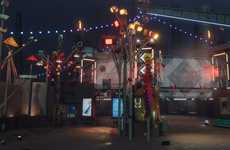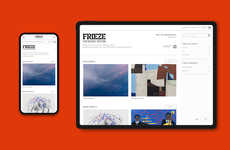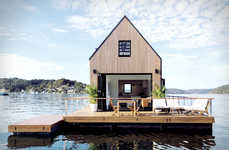
Burning Man 2020 is Going Completely Digital with Virtual Black Rock City
Laura McQuarrie — April 17, 2020 — Art & Design
References: burningman.typeform & luxurylaunches
Every year, thousands of people flock to Nevada to visit a temporary city and its community but Burning Man 2020 will be different as the event will be going completely virtual with an event called Virtual Black Rock City (VBRC.) For Burning Man 2020, Black Rock City will not be built physically in the desert but organizers will be virtually exploring the theme of The Multiverse.
The ticketed virtual festival will accommodate up to 100,000 attendees, acknowledging that people need connection more than ever. At the center of VBRC will be the temple designed by architect Renzo Verbeck and artist Sylvia Adrienne Lisse, which resembles an eight-point star.
According to the organizers, "We're not sure how it's going to come out; it will likely be messy and awkward with mistakes. It will also likely be engaging, connective and fun."
The ticketed virtual festival will accommodate up to 100,000 attendees, acknowledging that people need connection more than ever. At the center of VBRC will be the temple designed by architect Renzo Verbeck and artist Sylvia Adrienne Lisse, which resembles an eight-point star.
According to the organizers, "We're not sure how it's going to come out; it will likely be messy and awkward with mistakes. It will also likely be engaging, connective and fun."
Trend Themes
1. Virtual Art Festivals - Opportunity for artists and creators to showcase their work in a virtual environment, expanding audience reach and eliminating geographical constraints.
2. Virtual Communities - The rise of virtual communities to foster connection and engagement, providing an alternative platform for event organizers and attendees.
3. Digital Experiences - Increasing demand for immersive digital experiences that replicate real-life events, creating new opportunities for businesses to innovate and engage with consumers.
Industry Implications
1. Event Management - Event management companies can explore virtual event platforms, offering services to host virtual art festivals and create unique digital experiences.
2. Technology - Technological advancements can enable the development of virtual reality and augmented reality solutions, providing immersive experiences for attendees of virtual art festivals.
3. Arts and Culture - The arts and culture industry can leverage virtual art festivals to showcase and sell artwork, reaching a global audience and disrupting the traditional exhibition model.
6.1
Score
Popularity
Activity
Freshness























